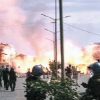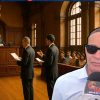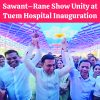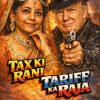Goa is abuzz with excitement as vintage bike and car owners, users, collectors and fans are decking […]
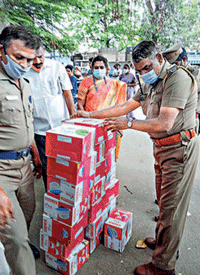
A DAY IN THE LIFE OF A POLL EXPENDITURE OBSERVER!BY ARVIND PINTO
ELECTION 2022, Feb 19- Feb 25 2022 February 18, 2022CAUGHT: It is the expenditure observer who keeps track of money and other goodies being distributed to voters by candidates, above is a picture of irons being distributed in UP. There have been reports of induction heaters and even scooters being distributed in Goa.
By Arvind Pinto
A former income-tax commissioner describes his experience as an election expenditure observer. The Election Commission sets a limit on a maximum expenditure that can be incurred by the candidate and the party. It is the responsibility of the expenditure observer to ensure that the limit is observed and that there is no act of bribing or inducement during the elections. Arvind Pinto has been a Central observer in five national and state elections.
IT is election season in India. With the residents of five significant states being called upon to choose a government of their choice. Goa has already chosen their representatives, their names lie sealed in the recesses of the EVMs that are now stored in safe places under guard by day and night by security forces.
While most of the media focuses on political parties, their leaders and opinion polls, let’s take a look at the administrative set-up in which the country has to conduct these elections. The Central Election Commission is an apex body, that is entrusted to conduct all elections to Parliament and elections associated on national level. There are also State Election Commissions that conduct elections at the level of the individual states. The Election Commission of India was indeed just another bureaucratic body, until the time it acquired an election commissioner. It was the election commissioner who instituted the system of election observers, a process that continues to this day
.
ELECTION OBSERVERS
I HAD the privilege of being an election observer to several national elections, having observed elections at various parts of the country. Observers are of two categories: general and expenditure. These observers are drawn from different parts of the country and from different services, expenditure observers are generally from the Revenue Services. Those chosen for this duty are at first called to Delhi for a meeting hosted by the Election Commission. Here there are assigned their duties.
The election process begins with the notification of the elections by the respective commission. The commissions then assume a semi-administrative role, to ensure that there are no major policy announcements, no undue wooing of the voters by favorable governmental largess as also to ensure that the administrative personnel are neutral. The pivotal role in the election process is the District Collector. It is his office that gives the nomination papers and receives the nomination of the candidates and scrutinizes the nominations.
During this process the election observers are at hand to supervise the process and to ensure that proper procedures are followed. The observers have a direct link with the Election Commission. In case of an extreme urgency, they can even contact the Election Commissioner. Besides they are required to send weekly reports to the Election Commission on the Election process in their respective districts.
AVAILABILITY OF FACILITIES
DURING the campaigning, the election observers go around the district, observing election rallies, they visit the various polling stations to inspect and report on availability of facilities at these stations. In the case of the expenditure observers, a report on the expenditure incurred by the candidates is required to be submitted.
As expected, all of these reports are careful to ensure that the expenditure declared is much below the limit. Recently, the government raised the limit of expenditure for Lok Sabha elections from Rs70 lakh to Rs95 lakh and for assembly elections from Rs28 lakh to Rs40 lakh. While in the books all candidates will ensure that their expenditure stays within the guidelines, the actual amount spent is way more than what is shown.
It is rumored that most candidates spend around Rs1 crore on a state election, while the figure for a Lok Sabha election is round Rs3 crore. Interestingly, where does this money come from? It is a fact that elections are an expensive proposition. The expenditure often begins with obtaining a seat. Most of the intending candidates have to spend to obtain their party’s nomination. Truly in politics there is no free meal!
Many of you living in Goa will have heard of free motor cycles or scooters being given and alcohol being available during elections. A particular grey area in the expenditure rules is that the expenditure incurred by a political party is not taken into account in the expenditure statement of the candidate. Thus, a major portion of the campaign by way of posters, advertisement materials, banners are incurred by the political parties on behalf of their candidates. The parties in power have access to greater resources as against the opposition parties.
However, it is to the credit of the Indian electorate that at times money and intimidation do not always work. The elections held in West Bengal are a case in point.
What are the biggest handouts during election time? Undoubtedly money, liquor and sarees. Politicians know that in all their constituencies there are pockets of migrants who are poor, whose votes can be bought. Most of these pockets are looked after by meetings with the leaders of the areas and groups. With the presence of election observers is has now become difficult to distribute money, liquor or sarees openly. Thus, this distribution happens either late evenings or nights when the election observers are safely in their circuit houses.
When does the distribution of the largesse take place? Candidates and political parties are shrewd enough to gauge that their goodies require to be given in time, when it results in the group or community voting in their favor. Thus, most of this distribution happens either a day before or on election day itself. Further, a common practice is to ferry voters to the polling station, especially in those places where the polling stations are at a distance.
CENTRAL TO DEMOCRACY
IN India, elections are central to our democracy, therefore our leaders while appealing to the electorate also realize that a portion of the electorate requires to be incentivized to vote in their favor. Despite the presence of observers, money and muscle power play an important role in winning the ballot box.
However, through seven decades the common man has been able to see through the games that politician play. So even while accepting whatever largesse is freely given — they often decide to vote for whoever they believe will give them good governance!





